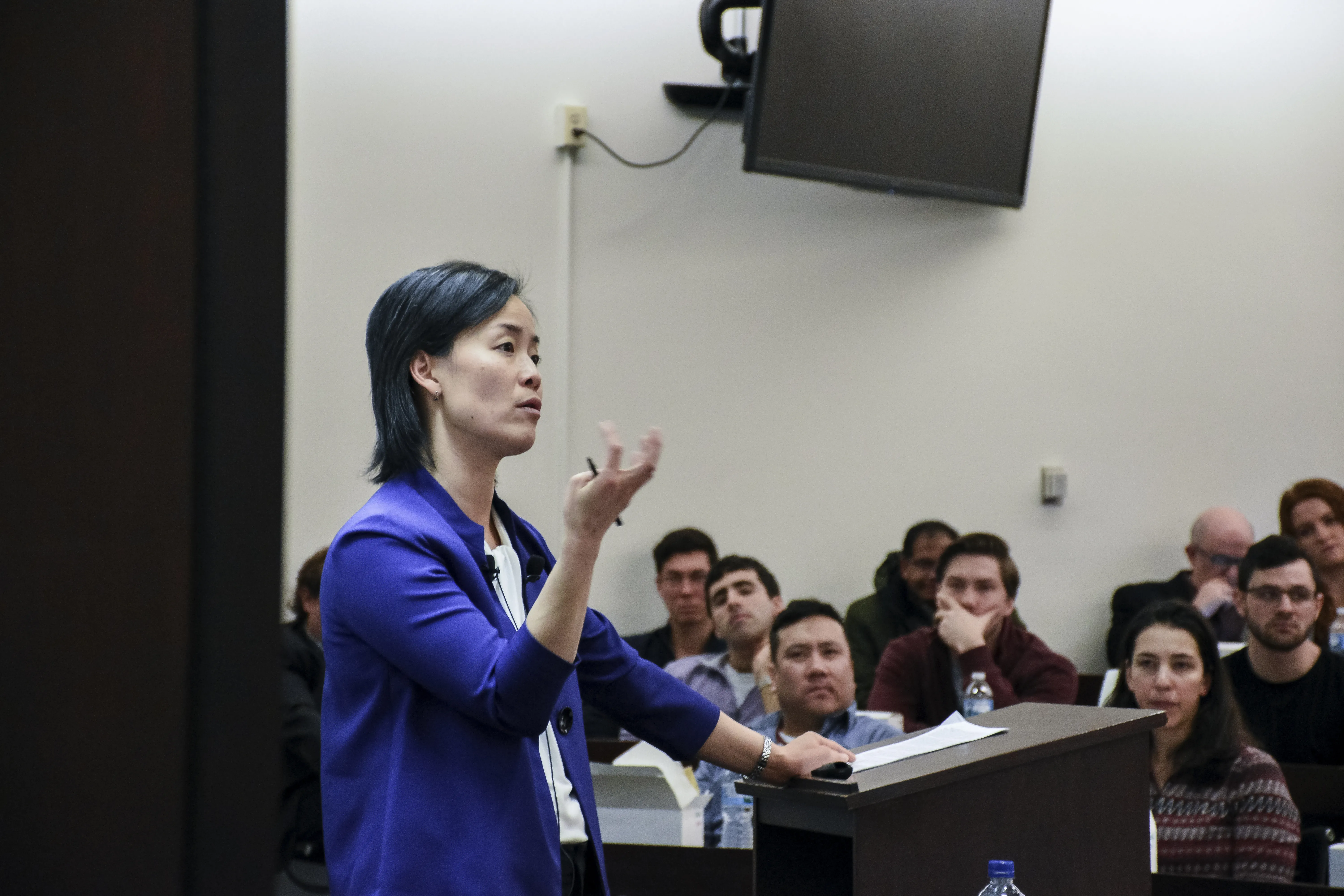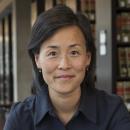Coase Lecture Explores the Role of Agency Heads

In the 1980s, the Environmental Protection Agency (EPA) reorganized, moving each of its subject-area economists—such as those in the air, waste, and water regulation offices—to a single, central office. Structural changes like these can affect an administrative agency’s efficiency, and the well-being of countless Americans, Professor Jennifer Nou told students during this year’s Coase Lecture in Law and Economics. Such changes, she added, are often made not by Congress or the president, but by agency heads themselves—making them more likely to go unnoticed by the American public.
“Since 1946, departmental orders [have been] responsible for creating 40 percent of all new agencies,” said Nou, Professor of Law and Ronald H. Coase Teaching Scholar. “I say departmental orders to contrast them from executive orders from the president. Departmental orders are issued by department heads—the Secretary of Health and Human Services, the Administrator of the EPA. Given that presidents rarely get personally involved in organizational matters . . . agency heads are likely the principle architects of these schemes.”
Agency heads frequently make decisions that impact real people in their day-to-day lives, Nou said, adding that there is a lot to be gained by examining their decisions through a law and economics lens. Throughout her lecture, “The Nature of the Agency,” she discussed how the late Ronald H. Coase’s insights on transaction costs in the context of private firms might apply in the political sphere.
In his 1937 article, “The Nature of the Firm,” Coase—who taught at the Law School for nearly five decades and won the Nobel Memorial Prize in Economic Sciences in 1991—argued that firms arise to bypass the cost of using the market by instead producing what they need internally.
“In other words, you're going to want to bring a transaction in-house when the transaction costs are lower in-house than they would be contracting it out onto the market,” Nou said.
Some might object to the analogy between the economic and political spheres, Nou acknowledged. After all, political behavior doesn’t occur on a free market, and there isn’t necessarily an incentive for profit maximization. But the line between firms and governmental institutions is notoriously blurred, she said. For example, the United States Postal Service is a commercial enterprise, and large corporations like Google and Facebook are political actors themselves. And even if there is no incentive for maximizing profit, she added, there is still an incentive for maximizing utility.
“[P]olitical actors, like economic ones, are utility-maximizing,” Nou said. “Perhaps we can understand that utility function in terms of maximizing the chances of your election, or maybe maximizing the probability that one's policy preferences will be achieved.”
Against that backdrop, the likelihood that an agency head will sub-delegate a particular task, for example, could be informed by Coase’s insights on the role of courts in enforcing market contracts, Nou said.
“One of Coase's insights was that courts are available to enforce market contracts but not to enforce intra-organizational arrangements,” Nou said. In other words, a court will not step in and enforce, for instance, how companies organize their operations. “If you think that there's some analogy in the administrative agency context, then the more courts make these sub-delegations judicially enforceable, the more one would expect sub-delegation to occur.”
One way that such subdelegations could be enforceable is through the Accardi Doctrine, which arose out of the 1954 United States Supreme Court case Accardi v. Shaughnessy. The doctrine provides that when an agency fails to follow its own procedures, that agency's actions are generally invalid. In particular, when an agency fails to abide by the subdelegation, the decision to do so can be challenged under Accardi. The existing doctrine, however, introduces a lot of uncertainty. To be enforceable, sub-delegations must take the form of legislative rules, which are notoriously difficult to isolate. It also opens up the substance of these rules to interpretation.
“One implication of all of this is that perhaps Coase's work helps us to better appreciate various calls for courts to adopt more bright-line rules in the Accardi context,” Nou said. “It doesn't matter what the rules are—just adopt something that's simple. For example, you could have a rule saying that as long as this sub-delegation has gone through notice and comment, you get Accardi.”
Toward the end of her talk, Nou mentioned Coase’s aversion to mathematical abstraction, saying it arose from a worry that such abstraction might lead the field astray. This is why the conversation between law and economics—the qualitative research conducted in tandem with the quantitative—is so critical.
“I don’t think empirical only means larger data sets,” Nou said. “Empirical simply means we need to understand more about the real world and talk with the individuals whose lives we purport to study and know. What a tribute to Ronald Coase and the Coase-Sandor Institute of Law and Economics that our law school fosters these kinds of conversations every year.”
